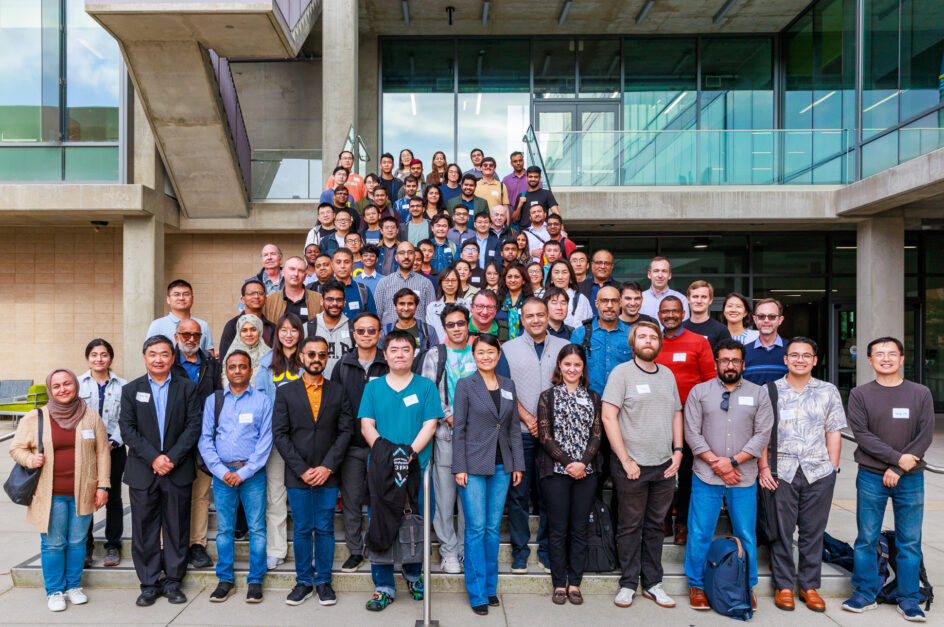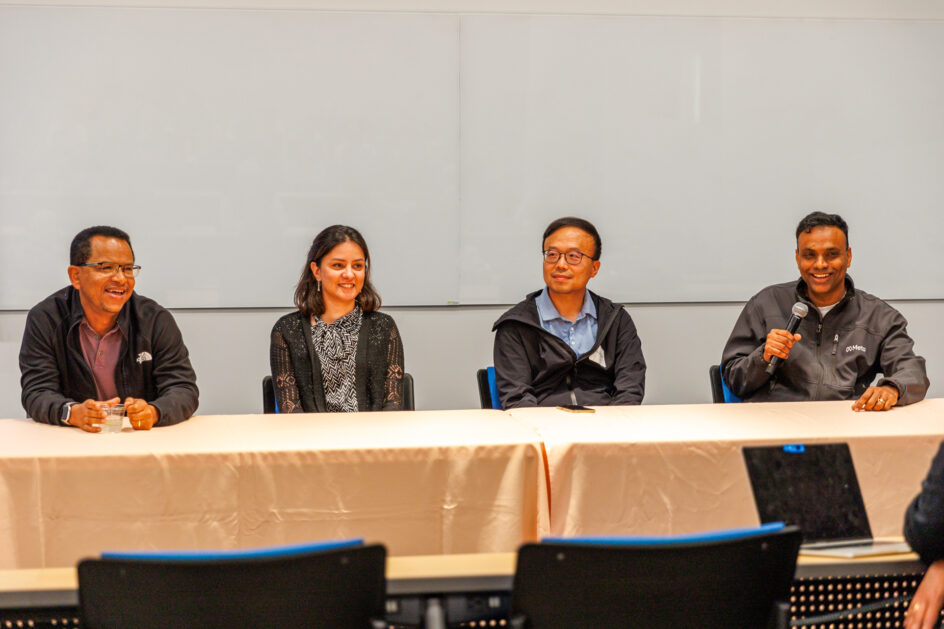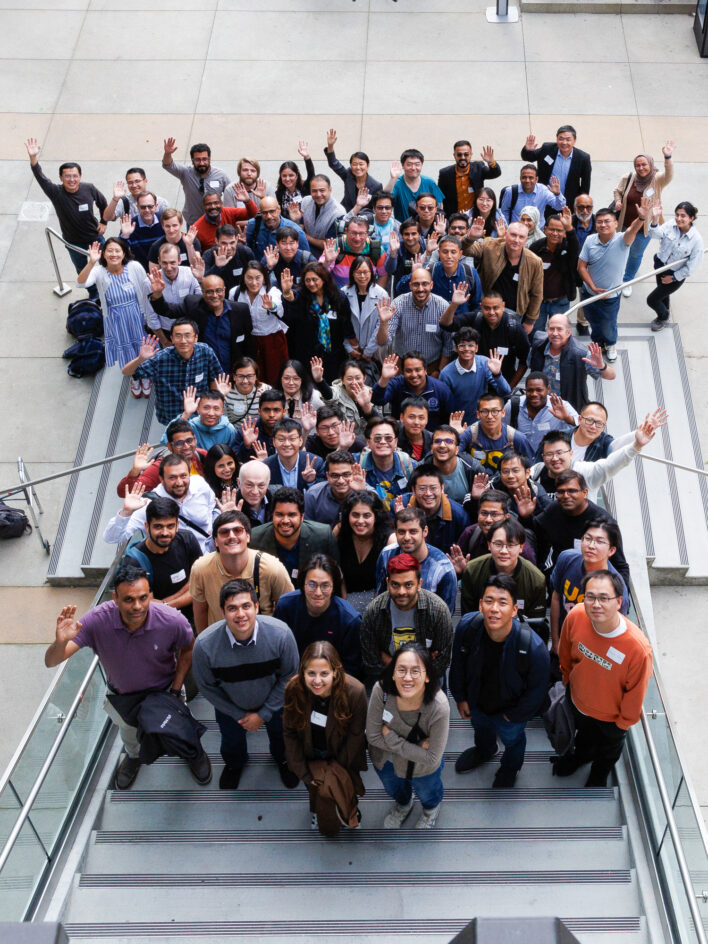A Time to Reconnect & Network: Information Systems Group Reunion
The gathering of Information Systems Group (ISG) alumni was purposefully both personal and professional, with discussions ranging from “how is your family?” to “how are you tackling the ever-growing demands of modern AI modeling and inference?” The unique event at UC Irvine was a year in the making and provided a relaxed space in which to blend shared experiences and research passions.
“We started talking in 2023 about hosting our first ever reunion for ISG alumni,” says Computer Science Professor Chen Li. “ISG alumni are doing very well, in a variety of career paths — in industry, in academia and at startups. So we wanted to create an opportunity for them to reconnect, share their experiences and possibly collaborate in new ways.”
Of the roughly 200 ISG graduates, more than 70 returned to UCI on May 23, 2024 to attend the reunion, organized by ISG faculty. “I hadn’t seen some of these people in over a decade,” says Li, “and it was great to welcome them back!”

The ISG Community
Many years ago, some faculty members within the Donald Bren School of Information and Computer Sciences (ICS) created ISG to give people a sense of belonging under the larger ICS umbrella. Comprised of Computer Science faculty and graduate students and offering weekly seminars, ISG is a place for research into all aspects of modern and next-generation information systems and technologies. Students help each other, fostering an environment of exploration and collaboration.
“What is unique about the ISG lab is that it creates a community of students who are interested in both tackling the fundamental research of computer systems and data management as well as the practical challenges of building these systems to have real impact,” says ISG faculty member Faisal Nawab. “The ISG reunion has been a testament to the effectiveness of this approach to managing a research lab, as we have witnessed the successes of its alumni in industry, academia and entrepreneurial endeavors.”
The ISG Reunion
The two-day event included technical talks, a panel discussion, and student poster and research presentations.
“We decided to mix things up without any kind of boundaries,” says Li, noting that they had considered breaking up the talks and discussion by career path but decided against it. “We invited people to talk about their current research and work, and our students shared some of the projects we’re focused on now, so it was a nice mix.”
The following ISG alumni gave technical talks:
- Alexander Behm, a software engineer at Databricks;
- Yun Huang, an associate professor at the University of Illinois at Urbana-Champaign;
- Shengyue Ji, a software engineer at Google;
- Yiming Ma, an AI platform manager at Axon; and
- Ronen Vaisenberg, a software engineer at Google.
“I aimed to bring life-lasting questions to students and share my journey of reinventing myself, hoping my experience could help students be open-minded to diverse opportunities,” says Huang, adding that it was great to catch up with old friends. “It was inspiring to see how our ISG members have flourished in different sectors.”
Vaisenberg similarly enjoyed seeing everyone, and his talk offered lessons learned during his 10 years at Google. “I also appreciated the talks, and the faculty reflecting on their careers. It created a sense of community, and I hope that we will build on the momentum of the reunion to help foster stronger connection between UCI ICS and its graduates over the years.”
In addition to the technical talks, Vinayak Borkar, cofounder of Mach5 Software, moderated a panel titled, “If I Could Turn Back Time.” The panel featured:
- Shiva Jahangiri, an assistant professor at Santa Clara University;
- Ravi Jammalamadaka, director of ML engineering at Adobe;
- Zhijing Qin, an engineering manager at Google; and
- Dawit Seid, a principal software engineer at Apple.

“My time at UCI has helped me a lot through my career, and it was really great to see how that was a common message across all the panelists,” says Borkar. “Dawit, Zhijing and Ravi all described how the Ph.D. process still shapes their life today, setting them up for success, while Shiva shared the unique perspective of an academic teaching computer science. It was wonderful see how each one of us had grown in the last decade.”
After hearing from alumni, ISG students Rahul Bhope, Vishal Chakraborty, Juncheng Fang and Yicong Huang gave research presentations. “It was interesting to hear about the impact of some of our earlier work,” says Li, “so we also wanted the alumni to see our current research and consider potential applications.”
A Model for Others
“It was truly wonderful to reconnect with our alumni, from those who graduated 25 years ago to those who were with us until very recently,” says Computer Science Professor Sharad Mehrotra. “ISG alumni are making a significant impact as leaders in their fields, and it’s deeply gratifying to know that we, as ISG faculty, played a part in their journey. These gatherings are vital, as they not only inspire our current students to reach new heights but also allow our alumni to take pride in their alma mater.”
ISG hopes to start hosting reunions every five years or so. In the meantime, the UCI ISG LinkedIn group is available to help alumni stay better connected.
ISG faculty are considering putting together a showcase event as well, highlighting student work for industry collaborators. “Our students are doing very interesting work, and people in both academia and industry could benefit from hiring them,” says Li, “so perhaps we’ll do a smaller event to showcase ISG research and promote our students.”
ISG faculty are also open to helping other research groups host similar gatherings. “I think this model could be replicated in different groups within ICS,” says Li. “I’m happy to talk with anyone interested, because it really does help people reconnect and further develop their careers.”
Jason King, Director of Corporate Relations in ICS, stresses that ISG isn’t just a model for planning a reunion. “They’re the gold standard when it comes to running a research group,” he says. “The synergy among the faculty and students and their depth of expertise brings significant value to their collaborations, whether advancing academic work, fostering tech transfer, or partnering with industry leaders. They have something special.”

— Shani Murray